

Educational Research Methods. Research is generally designed, in outline at least, before data collection commences.
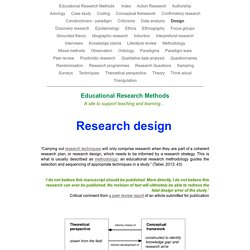
The extent to which research designs are flexible, depends upon the paradigmatic commitments underpinning the research. Designs in confirmatory research tends to be fixed, but in discovery research there is more flexibility, and scope for ‘emergent’ research design. In grounded theory studies, the research design is said to be emergent as the final form becomes clear during the study after data analysis has commenced. Multiple methods and coherence Some research designs are based around a single approach to collecting and analysing data (i.e. method or technique) and others involve multiple techniques. Management Theories. Writing theoretical frameworks, analytical frameworks and conceptual frameworks. Three of the most challenging concepts for me to explain are the interrelated ideas of a theoretical framework, a conceptual framework, and an analytical framework.
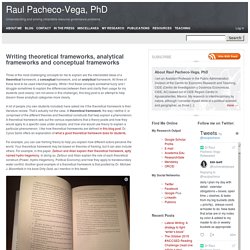
All three of these tend to be used interchangeably. While I find these concepts somewhat fuzzy and I struggle sometimes to explain the differences between them and clarify their usage for my students (and clearly I am not alone in this challenge), this blog post is an attempt to help discern these analytical categories more clearly.
Anderson & Anderson's Change Model. Anderson & Anderson’s model of change provides a comprehensive coverage of the entire process of change and equally explains the whole process of change as a cyclical process (Anderson and Anderson, 2001, p. 13).
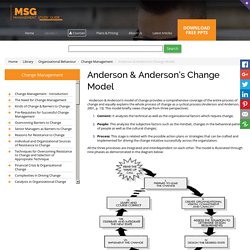
This model briefly views change from three perspectives: Content: It analyzes the technical as well as the organizational factors which require change; People: This analyzes the subjective factors such as the mindset, changes in the behavioral patterns of people as well as the cultural changes; Process: This stage is related with the possible action plans or strategies that can be crafted and implemented for driving the change initaitive successfully across the organziation. All the three processes are integrated and interdependent on each other. The model is illustrated through nine phases as demonstrated in the diagram below: Source: Adapted from Anderson and Anderson (2001, p. 15)
Uri Alon: Why truly innovative science demands a leap into the unknown. Concept Mapping as Alternative to Survey Research. Open-i Biomedical Image Search Engine- Open-i. Refining Your Topic. Return to Main PageReturn to Starting to Write Information Power/Refining Your Topic* The refining or narrowing process begins as soon as you select a topic.
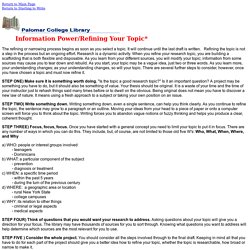
It will continue until the last draft is written. Refining the topic is not a step in the process but an ongoing effort. Research is a dynamic activity. STEP ONE) Make sure it is something worth doing. STEP TWO) Write something down. STEP THREE) Focus, focus, focus. Conceptual Frameworks Learning Object. Graphic Organizers.
Research.Design. Conceptual Mapping.www.Sites. Using the framework method for the analysis of qualitative data in multi-disciplinary health research. 35281_Chapter1.pdf. Conceptual Framework. The Conceptual Framework Model The conceptual framework for the College of Education (COE) describes the shared vision which provides coherence for both the initial and advanced programs for the preparation of teachers and other professional school personnel.
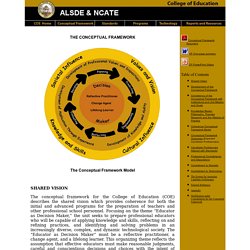
Focusing on the theme “Educator as Decision Maker,” the unit seeks to prepare professional educators who will be capable of applying knowledge and skills, reflecting on and refining practices, and identifying and solving problems in an increasingly diverse, complex, and dynamic technological society. The “Educator as Decision Maker” must be a reflective practitioner, a change agent, and a lifelong learner. This organizing theme reflects the assumption that effective educators must make reasonable judgments, careful and conscientious decisions and choices with the intent of optimizing student learning outcomes; it emphasizes the view of decision making as an ongoing, interactive, and empowering process. document. Content Knowledge 1.
Conceptual-theoretical%20Framework.pdf. Difference Between Conceptual & Theoretical Framework. Differences Between Theory and Concept.
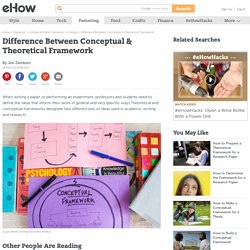
The Role of Theory in Qualitative Research. Understanding Theoretical Framework - Dissertation. Theoretical Frameworks. Contents Why use a Theoretical Framework?
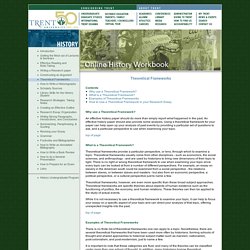
An effective history paper should do more than simply report what happened in the past. An effective history paper should also provide some analysis. Patton: Research Approaches and Theoretical Frameworks. Theoretical Framework. "2015-08-19 17.00 Theory _ Theorist_ The Theoretical Frame..." - Videos - Viddler. What is a theory. 51. Assessing Data Assumption for Parametric Statistical Analyses - 9/7/2016_0. Social Theories: Public Health. Boston University. Public health is a multi-disciplinary field that aims to 1) prevent disease and death, 2) promote a better quality of life, and 3) create environmental conditions in which people can be healthy by intervening at the institutional, community, and societal level.
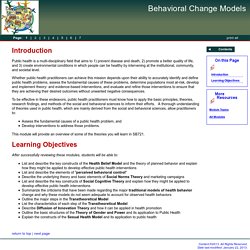
Whether public health practitioners can achieve this mission depends upon their ability to accurately identify and define public health problems, assess the fundamental causes of these problems, determine populations most at-risk, develop and implement theory- and evidence-based interventions, and evaluate and refine those interventions to ensure that they are achieving their desired outcomes without unwanted negative consequences. To be effective in these endeavors, public health practitioners must know how to apply the basic principles, theories, research findings, and methods of the social and behavioral sciences to inform their efforts. RSCH8300QualitativeResearch - Theoretical and Conceptual Frameworks.
Elements of a theoretical framework. Theoretical Framework A theoretical framework is a collection of interrelated concepts, like a theory but not necessarily so well worked-out.
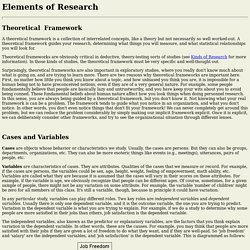
A theoretical framework guides your research, determining what things you will measure, and what statistical relationships you will look for. Theoretical frameworks are obviously critical in deductive, theory-testing sorts of studies (see Kinds of Research for more information). In those kinds of studies, the theoretical framework must be very specific and well-thought out. Surprisingly, theoretical frameworks are also important in exploratory studies, where you really don't know much about what is going on, and are trying to learn more. Theoretical Framework. Research developing theoretical and conceptual frameworks. Theoretical Framework. IIER 14: Smyth - a conceptual framework as a research tool. The paper addresses these issues by providing evidence in answer to three main questions.
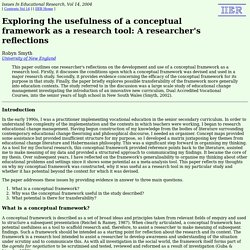
In my study of educational change management surrounding the implementation of vocational education in the NSW State school system, I was interested in exploring whether appropriate change management practices, identified in the educational change and leadership literature, were evident and successful. In order to investigate these ideas from the literature, I needed a metacognitive perspective. Assumptions expounded by the constructivist movement concerning the nature of knowledge provided an apparently secure philosophical tether for my investigation of complex interactions between practitioners and system administrators. These assumptions informed the development of the conceptual framework as well as the research design and the means of investigating the realities of the situation (Smyth, 2002 Ch. 3).
Nevertheless, there are some cautions to be aware of when utilising a conceptual framework. Theoretical Framework. Lesson I-2 - Integrating Conceptual Frameworks. A conceptual framework provides one or more lens through which the research problem is viewed. The lens can be a worldview, such as Marxism or democracy, that informs a study. It can be theories, such as those of Freud, Piaget, and Kolberg, that explain certain phenomena in considerable detail. Theory in Human Resource Development. What are the types of research frameworks? - MathEd Studies. 5. Knowledge of Conceptual Frameworks for Practice. In social work, it is not possible to separate theory from practice or concept from action. In fact, practice is the process of using knowledge and applying theory in order to bring about specific types of change. A practice uninformed by theory tends to become repetitive and sterile, whereas theory uninformed by the realities of practice tends to be merely interesting and usually irrelevant.
The many theories, models, and perspectives discussed in the social work literature can all be considered conceptual frameworks. Research design for Conceptual Framework and Theoretical Model. Almost all research studies in social and behavioral sciences regardless of disciplines/programs require a rationale or base for conducting research. This rationale/base is often called theoretical framework. A host of researchers have provided varying definitions of theoretical framework (Sekaran, 2000; Camp, 2001; Elliott; 2005, Tuckman, 1999). EXPLAINING HUMAN BEHAVIOR: SOCIAL & ORGANIZATIONAL THEORIES. Home > E-book list > Explaining Human Behavior: Social & Organizational Theories Overview. Theoretical Conceptual Frame GSDC Notes.
Institutional Theory [About Organizations]